Having asked others to write up their working lives, I couldn’t not do my own. And in any case, Mr Doig said I had to…….
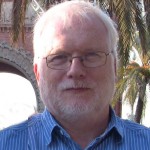 I was born on 25th May 1947, an original babyboomer. I was the eldest of four, with my twin brothers and younger sister. We weren’t quite part of a Monty Python sketch, but we weren’t exactly a rich family, and the six of us shared one bedroom and one living room in Tufnell Park, in north London. In those days televisions were for people rather richer than we were, but we listened to lots of radio. My brothers, father and I used to sit in the living room listening to Journey into Space – scary stuff, especially the Red Planet series. My mother would disappear somewhere as it was all too much for her.
I was born on 25th May 1947, an original babyboomer. I was the eldest of four, with my twin brothers and younger sister. We weren’t quite part of a Monty Python sketch, but we weren’t exactly a rich family, and the six of us shared one bedroom and one living room in Tufnell Park, in north London. In those days televisions were for people rather richer than we were, but we listened to lots of radio. My brothers, father and I used to sit in the living room listening to Journey into Space – scary stuff, especially the Red Planet series. My mother would disappear somewhere as it was all too much for her.
My father was a sheet metal worker, and seemed to earn £16 per week all his life. In 1957 the company he worked for moved from London to Watford and there we lived in a three bedroom terrace house in Balmoral Road for some years. Every so often my parents took in waifs, strays or lodgers so things would get really crowded again. After passing the 11-plus I went to Watford Technical High School, a part of an initiative of the 1950s to train more technical people, as we had too many doing arts. Little seems to have changed in the more than half century since then. Technical high schools went away when someone decided that comprehensive schools were a better idea. They were wrong.
As a growing boy of the 1950s, I read the Eagle comic (not Beano or Dandy) and was a trainspotter – LMS, if you want to know. I wanted “to be a pilot in the RAF when I grow up”. I didn’t know then that wearing glasses from the age of six was going to make that ambition impossible, though I did find out when I was about 14. My parents used to tell those w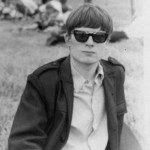 ho enquired that “he wants to do a job using his hands” when asked about my career thoughts, and in 1962 when I was 15 I found that job. After my weekly bath on Saturday nights I would watch Perry Mason on our newly rented telly, followed by a new satire show called That Was The Week That Was. It was controversial stuff and made the headlines often, but it unintentionally found a career for me. Between sketches they’d cut to a wide shot of the studio, and cameras and mic booms would thrash around getting to their next position. Soon enough I was watching the crew rather than the satire. That was what I wanted to do – be a cameraman at the BBC.
ho enquired that “he wants to do a job using his hands” when asked about my career thoughts, and in 1962 when I was 15 I found that job. After my weekly bath on Saturday nights I would watch Perry Mason on our newly rented telly, followed by a new satire show called That Was The Week That Was. It was controversial stuff and made the headlines often, but it unintentionally found a career for me. Between sketches they’d cut to a wide shot of the studio, and cameras and mic booms would thrash around getting to their next position. Soon enough I was watching the crew rather than the satire. That was what I wanted to do – be a cameraman at the BBC.
I wrote to the BBC whilst I was in the fifth form, and received a copy of Technical Careers 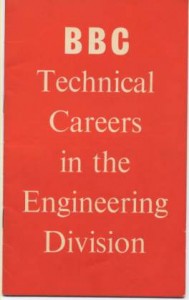 in the Engineering Division, which said I had to be eighteen and have studied two A Levels. There was really nothing in the way of suitable subjects, so I did the ones I was least worst at – Pure Maths, Applied Math and Physics. My final results were rubbish – two average passes – but the deal was that you had to have studied, not passed. They wanted an appropriate interest and aptitude, not academic brilliance – thank goodness. During the lower sixth I thought that maybe – unlikely but possible – the BBC wouldn’t want me, and wrote some letters to ITV companies. ABC-TV, at Teddington, replied and offered an interview – and after the interview offered a trainee job. Even now, I’m a touch astonished that I turned it down in favour of finishing my A levels and trying to get a similar job at the BBC with no guarantee of success.
in the Engineering Division, which said I had to be eighteen and have studied two A Levels. There was really nothing in the way of suitable subjects, so I did the ones I was least worst at – Pure Maths, Applied Math and Physics. My final results were rubbish – two average passes – but the deal was that you had to have studied, not passed. They wanted an appropriate interest and aptitude, not academic brilliance – thank goodness. During the lower sixth I thought that maybe – unlikely but possible – the BBC wouldn’t want me, and wrote some letters to ITV companies. ABC-TV, at Teddington, replied and offered an interview – and after the interview offered a trainee job. Even now, I’m a touch astonished that I turned it down in favour of finishing my A levels and trying to get a similar job at the BBC with no guarantee of success.
Well, the next year I got a BBC interview and then got the BBC job, having absolutely no idea at the time of the competition for it. Thousands applied, tens got in.
On April 25th 1966 I took myself off to Evesham to join TO25 – Technical Operator Course No 25. There were around 30 of us. I didn’t know till I got there that we could be sent anywhere the BBC had a base, and was mightily relieved on the first day to find that I was assigned to Television Centre. I think 12 of us went to TC, and much, much later I was the last of TO25 to leave the place. The course lasted 3 months and even at the time seemed a little odd. We were to be technical operators – trainee camera and sound people, but we spent a lot of time learning about engineering stuff from engineer lecturers. Resistor networks and Post Office Lines Testing Equipment seemed a long way from what we thought we’d joined for. I met Anthony “Mitch” Mitchell and we were lab partners – we were the naughty boys of the course and were told off for playing at being cameramen instead of doing the technical experiments about focal length or whatever. Despite that, 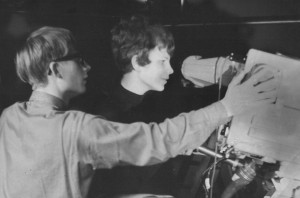 Evesham was actually good fun, most of us could easily manage the work, and eventually we had the chance to play on the gear. Most of us also were away from home for the first time, and the BBC Club and the girls of Evesham beckoned. We went home most weekends – I had no transport of my own, and hitched lifts, including an extremely uncomfortable ride in the back of a Willy’s Jeep owned by John Hawes. Someone else had a Messerschmitt bubble car that couldn’t get up the big hill at Broadway.
Evesham was actually good fun, most of us could easily manage the work, and eventually we had the chance to play on the gear. Most of us also were away from home for the first time, and the BBC Club and the girls of Evesham beckoned. We went home most weekends – I had no transport of my own, and hitched lifts, including an extremely uncomfortable ride in the back of a Willy’s Jeep owned by John Hawes. Someone else had a Messerschmitt bubble car that couldn’t get up the big hill at Broadway.
When the course was over we stepped into the big world of BBC Television. We didn’t know it, but it was the golden age of British tv, the middle of the swinging sixties, and we were at the heart of it – it wasn’t ever going to get better. An awful lot of people would have killed for our job…….except that what we soon found out was that our jobs mostly consisted of dragging cables behind slightly older and rather more fortunate colleagues. We had arrived at the back end of the great expansion for BBC2, and the only chance of progression was to wait (and wait) for our turn. Despite what it had promised in Technical Careers in the Engineering Division, it was seven years till I finally became a real cameraman. In the meantime we went to work each day hoping that we’d be given a 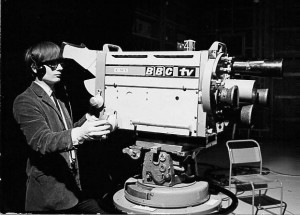 chance on a camera. To be fair, it did happen reasonably often, as schools and children’s programmes were seen as a chance for the more senior staff to take it easy and let the juniors learn. Most of the time though, we operated the back end of camera cranes and dragged cables. It depended who was in charge of the crew what sort of day we had – you couldn’t beat tracking someone like Ron Green, but not all crews were fun, and it could get very depressing when you were on your umpteenth day of dragging cables.
chance on a camera. To be fair, it did happen reasonably often, as schools and children’s programmes were seen as a chance for the more senior staff to take it easy and let the juniors learn. Most of the time though, we operated the back end of camera cranes and dragged cables. It depended who was in charge of the crew what sort of day we had – you couldn’t beat tracking someone like Ron Green, but not all crews were fun, and it could get very depressing when you were on your umpteenth day of dragging cables.
Colour television arrived at Television Centre soon after we did, and with it the Marconi MkVII camera, a huge unwieldy evil object. The steering rings on the camera pedestals had to be made much bigger, making it very difficult for the cameraman to crab the thing without help. We were the help – the ped tracking pool, well known for sitting around endlessly in Blue Assembly waiting for work. A lot of people left or moved to other 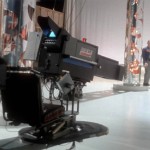 departments. I had an offer from London Weekend to be a “number 5 cameraman” . I put in my resignation and was told I had to take my leave, a month’s worth, so I went off to LWT. It turned out that the job was really a tracker, LWT was in big trouble, and the place was full of angry unfriendly people. After days of angst I withdrew my resignation, and was instantly back on duty standby on the tracker pool.
departments. I had an offer from London Weekend to be a “number 5 cameraman” . I put in my resignation and was told I had to take my leave, a month’s worth, so I went off to LWT. It turned out that the job was really a tracker, LWT was in big trouble, and the place was full of angry unfriendly people. After days of angst I withdrew my resignation, and was instantly back on duty standby on the tracker pool.
I must admit that I’d forgotten all this doom and gloom till I started writing this, and what I’ve said so far ignores the enormous exhilaration and fun and the consuming passion and pride I had for being a BBC cameraman (nearly). I still have all my diaries for my camera years. They just have the names of programmes and the time and studio, but they paint a picture of BBC TV in its greatest days. There were weeks when we’d go from Shakespeare to opera to current affairs, one after another. A live variety show at the TV Theatre followed by Top of the Pops followed by a poetry programme. I was there when Jimi Hendrix played live in TC4, and when Apollo 11 landed on the moon. I worked on a whole series of 26 Softly Softlys, the first series of Doomwatch and just one Onedin Line. Playschool, Nationwide, a test to see what the insides of a Dalek might look like, and the title sequence for Wagner’s Flying Dutchman. Play for Today, Out of the Unknown, Theatre 625, Playschool and Jackanory. I’m very glad I was there.
Over the years between 1966 and 1973 I moved up from cable basher to dolly operator 1, and I’m proud of the fact that I gained a reputation as a top tracker. I drove the crane on the live Lulu Show – 26 bars right round TC4 during the opening titles – and I drove a Heron at a continuous slow pace through a seven minute classical piano piece hitting the marks every minute or so. I tipped over a huge Christmas tree on the Mantovani Show – but I had warned everyone, they just hadn’t listened. Les Thorn and I were once choreographed by Gillian Lynn, who couldn’t grasp that a Chapman Nike crane arm has rather more inertia than a dancer and can’t just stop once going at a fair lick. I did a block of TOTP as Al Kerridge’s tracker and managed to rip a long slot in the lino floor during the live show. It made a guest appearance in The Man in the Iron Mask, a Sunday afternoon drama. They did a bad repair on it, and during a post TOTP recording of the Stones doing Jumping Jack Flash, I ripped it all up again so the studio had to be taken out of service. We worked an irregular lifestyle, four days a week, any hours any days. It meant that 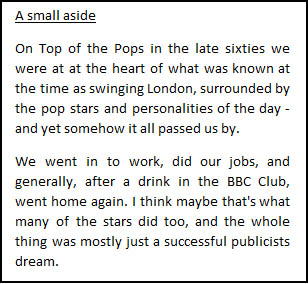 you could never do an evening class or make any other regular commitment, but you’d often be off on weekdays whilst everyone else was going to the office. Compared to most of the rest of my career it was an idyllic lifestyle, though as usual in these things we didn’t know when we were well off.
you could never do an evening class or make any other regular commitment, but you’d often be off on weekdays whilst everyone else was going to the office. Compared to most of the rest of my career it was an idyllic lifestyle, though as usual in these things we didn’t know when we were well off.
Eventually I had waited long enough and was promoted to cameraman – and found that it wasn’t enough any more. It was great to finally have the right to be on a camera every day I went in, but I listened enviously to those who directed us – the good, the indifferent, and the bad. I wanted that job – to have a number of cameras operating for me to make tv – though in which area I didn’t know.
Us junior cameramen took stints in Pres – working in the two small studios on the fourth-and-a-half floor that belonged to the Presentation department. I did some time in Pres B on Late Night Line Up and Whistle Test, but mostly I was in Pres A where they made the trails and did the weather. It was very undemanding work most of the time, pointing cameras at captions to be superimposed on trails. One high point was when a trail caption had to be replaced live because of a programme change. The original was one of a set that was on 35mm, so I had fun with the replacement by gently wobbling the live camera to simulate 35mm telecine gate weave.
My personal biggest moment was one evening when I was the late cameraman. The Pres production people would let two of us go home after the six o’clock weather if things were quiet. On this particular evening, an Apollo was due to land on the moon – Apollo 15, I think. They had decided that it was no longer worth staffing TC7 all through the trip, and so James Burke was oov in Houston, with Patrick Moore and others oov in London, all controlled by producer Dick Francis in ICR, along the corridor from Pres A.
They were due to carry the landing live at 9.25 on BBC1 using NASA pictures, but at the last minute everything went pear-shaped when NASA decided they should do some more orbits of the moon. BBC1 was suddenly going to consist of just that picture of the Houston control room for the 45 minute slot.
At about 15 minutes past nine all hell broke loose in Pres A, as Pres Producer Pat Hubbard arrived from the bar and announced that we would cover, and went off to discuss with Mr Francis what we’d do. Left in the studio with seven minutes to go were five slightly bemused people.
The sound man went hunting for mics. Assistant producer Orwyn Evans and I rustled up chairs and a table stolen from Late Night Line Up, whilst the S.Tel.E and Harry the sparks did the lights. Then Patrick Moore and two others (we had expected one) turned up asking how they would hear James Burke in Houston. The sound man and I found some earpieces, but the only feed available was zero level talkback – starring the tired and emotional Pat Hubbard.
For the first, and, I think, only time in my life, I was in charge of the camera crew. Orwyn had left school wanting to be a cameraman, but not, it has to be said, live at 9.25 on BBC1 for his first show. Harry was dragooned into being floor manager.
I showed Orwyn the zoom and focus on one of the cameras and told him to just do as he was told, then went to operate the other two.
As soon as we went on the air, Pat opened up the local Pres intercom to Network 1 and ICR, and shouted loudly and rudely at everyone. I tried to quietly use my camera intercom to explain to Pat that Patrick and co were hearing his talkback (as he was saying “Ok, tell Patrick to shut up”). Patrick soldiered on professionally (“We just don’t know!”) for the 45 minutes whilst wincing at the din in his ear. Next day, we made the Daily Mirror.


